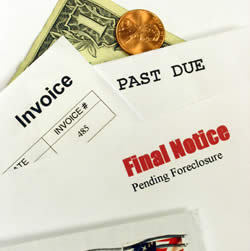 With economy hurting and unemployment reaching record levels, harassing phone calls from debt collectors have become a way of life for many Americans. My clients inform me that collection agency calls can be rude, threatening, and manipulative. For some, the calls are so bothersome that phone numbers have to be changed or disconnected to stop debt collection calls. Many consumers don’t realize that they are guaranteed protection under the law. The Fair Debt Collection Practices Act (FDCPA) has very clear rules about what debt collectors are allowed to do and not to do:
With economy hurting and unemployment reaching record levels, harassing phone calls from debt collectors have become a way of life for many Americans. My clients inform me that collection agency calls can be rude, threatening, and manipulative. For some, the calls are so bothersome that phone numbers have to be changed or disconnected to stop debt collection calls. Many consumers don’t realize that they are guaranteed protection under the law. The Fair Debt Collection Practices Act (FDCPA) has very clear rules about what debt collectors are allowed to do and not to do:
WHY THEY CAN CALL
First, they can only call you about debts that they can prove that you owe. When a debt collector first contacts you about a debt, you have the right to request them to verify the debt is yours. If the debt collector can’t come back with proof that you owe the debt, they’re not allowed to contact you anymore.
WHEN THEY CAN CALL
They also may only contact you during certain hours, between 8am and 9pm your local time. They can’t call you repeatedly, and they can’t call you at anytime you’ve previously stated is inconvenient. If they do break any of these rules, including calling late at night, you can sue for damages. Most will stop when they hear you merely mention the Fair Debt Collection Practices Act.
WHAT THEY CAN’T DO
- If a debt collector does any of these things, you can in sue in state or federal court and win $1,000 plus recover the cost of any damages you suffered, along with attorney’s fees.
- Use threats of violence or harm
- Publish a list of consumers who refuse to pay their debts
- Use obscene or profane language, or repeatedly use the telephone to annoy
- Use any false or misleading statements, such as imply that they are attorneys or government representatives, imply that you have committed a crime; hint that they work for a credit bureau, say you will be arrested if you don’t pay the debt, or use a false name.
WHAT YOU CAN DO
The FDCPA includes a provision that allows you to tell a debt collector not to contact you again. You must send your request to cease contact in writing to the collector. There is no special phrasing required, just make it very clear that you want communication to cease and that the collector is in violation of the FDCPA. Send the letter certified mail with return receipt requested, so if the harassment continues, you have proof that they received your request. Once the collection agency receives your cease and desist letter they can communicate with you once more, via mail, letting you know one of three things: that further efforts to collect the debt are terminated, that certain actions may be taken by the debt collector, or that the debt collector is definitely going to take certain actions.
 What Makes Me Different From the Others?
What Makes Me Different From the Others?